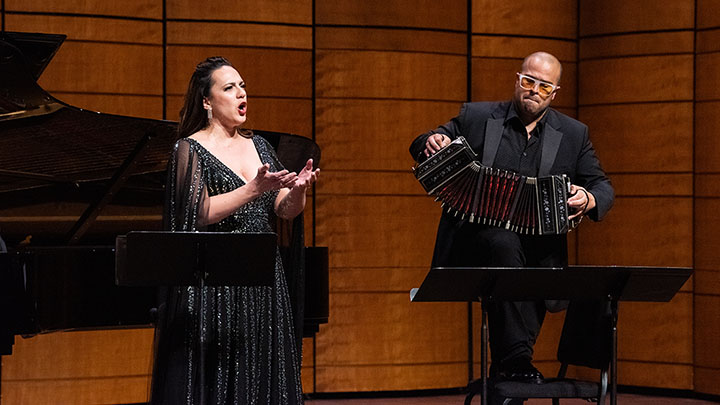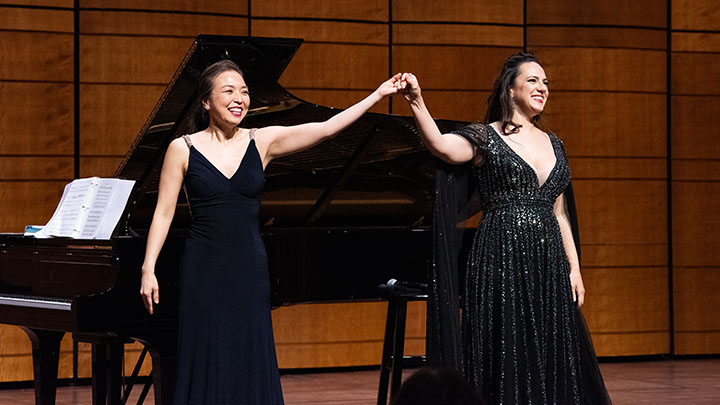Mack’s stage career in the fifteen years or so since she graduated from the Merola program has steadily traversed the bread-and-butter mezzo repertoire through Rossini, though with a special focus on the music of Handel and a healthy dose of rarities. My most recent encounter with the singer was in Rossini’s Otello at Opera Philadelphia, where she did much to anchor what might have been merely a pleasing curiosity with an intense, dramatically grounded take on (the other) Desdemona.
She has only appeared at the Met in one production to date (debuting as the Kitchen Boy in Rusalka, though it looks like there was a Varvara in Ká?a Kabanová derailed by the pandemic), but that is set to change this month with the upcoming staging of John Adams’s El Niño. This, and her assumption last year of the title role in LA Opera’s Ultimo Sueno de Frida y Diego, are just two of examples of Mack’s attention to both new music and stories rooted in the Latin world (Mack was born in Buenos Aires). Thursday’s recital leaned heavily into these interests, with a world premiere song cycle by Rene Orth and a second half entirely devoted to Spanish-language songs.
Mack’s inviting core sound has a focused, slatey quality that can disarm with its solidity and presence, despite not being especially large. As heard this past week, it has highly a versatile foundation to meet the varied stylistic demands of the repertoire she pursues. A communicative performer on the recital stage as well, she embroiders each song with character details and interpretive choices that continually engage the listener.
The closest the program came to Mack’s stage work came in the opening selection of Rossini’s Giovanna d’Arco, a “solo cantata” from the composer’s Paris years. The ambitious fifteen-minute scena offered Mack a chance to display in miniature the dramatic variety she is capable of in the theater, as well as the corresponding vocal range: resonant low notes adding heft and color to the initial recitative section, a noble, dignified sound in the plaintive appeals to the character’s mother, and in the showpiece finale, an ability to integrate the fioritura material into lines with shape and direction.
The rest of the half was devoted to the world premiere At First, Now, Always. Orth, whose music for the new opera 10 Days in a Madhouse made a strong impression in Opera Philadelphia’s fall festival last year, here sets a sprawling text of nine songs by Jeanne Minahan on different aspects of motherhood. There was much to enjoy early on, the vocal line tugging at a poignant lyricism that stayed on the right side of saccharine, most winningly in the third song “After,” vulnerably read by Mack, her mezzo bright and precise. Later installments were less successful: the text, now addressing an adult child, became less abstract and felt like the final songs in a musical we hadn’t been watching, while a static quality crept into the vocal writing, winsome lines interrupted by sporadic vocal climaxes that seemed unmotivated by the text. The expressive and detailed piano writing was a highlight throughout, as skillfully realized by Lee.
Four songs of Astor Piazzolla (arranged by JP Jofre) kicked off the all-Spanish language second half, for which Mack and Lee were joined by the arranger on bandoneon (a relative of the accordion introduced in Argentina in the 19th century). After the piercing clarity of the Orth, Mack introduced a very different set of vocal colors here, a beguiling chocolatey sound for the opening “Vuelvo al Sur,” colorful spread vowel sounds, and a cutting swagger in the closing “Yo Soy Maria” from Piazzolla’s stage piece Maria de Buenos Aires. In a few instances the low range and less supported style resulted in Mack’s unamplified voice getting lost in the enhanced forces, but this was an enchanting set overall.
Mack next gave a delicate reading of “Dulces Sueños,” a composition by Jofre, which served as a bridge to the next two selections by the famed early 20th century tango singer Carlos Gardel. Mack turned each of these popular songs into a riveting dramatic monologue, hushed and almost speaking at times, particularly in her bitter rendering of “Volver,” while Keun-A Lee deftly wove the tango elements in the piano part around Mack’s voice.
The home stretch featured the music of Spain, though “Spain” is probably more appropriate for the first selection: Rossini’s arch fantasia, “Canzonetta Spagnuola,” slyly delivered here. Federico García-Lorca’s impressionistic “La Tarara” showcased how secure and exciting Mack’s upper range could be at its most free, while Ruperto Chapi’s blistering “Carceleras” from his zarzuela Las hijas del Zebedeo featured breakneck diction and an ecstatic finish.
For the encores we first returned to “Spain” for a perfectly pleasant “Habanera” from Carmen, which Mack has performed onstage at Santa Fe among other locations. The real fire was reserved, however, for the second encore, in which Mack delivered a blistering rendition of “Malaguena” by Cuban composer Ernesto Lecuona.
Photos: Courtney Ruckman




